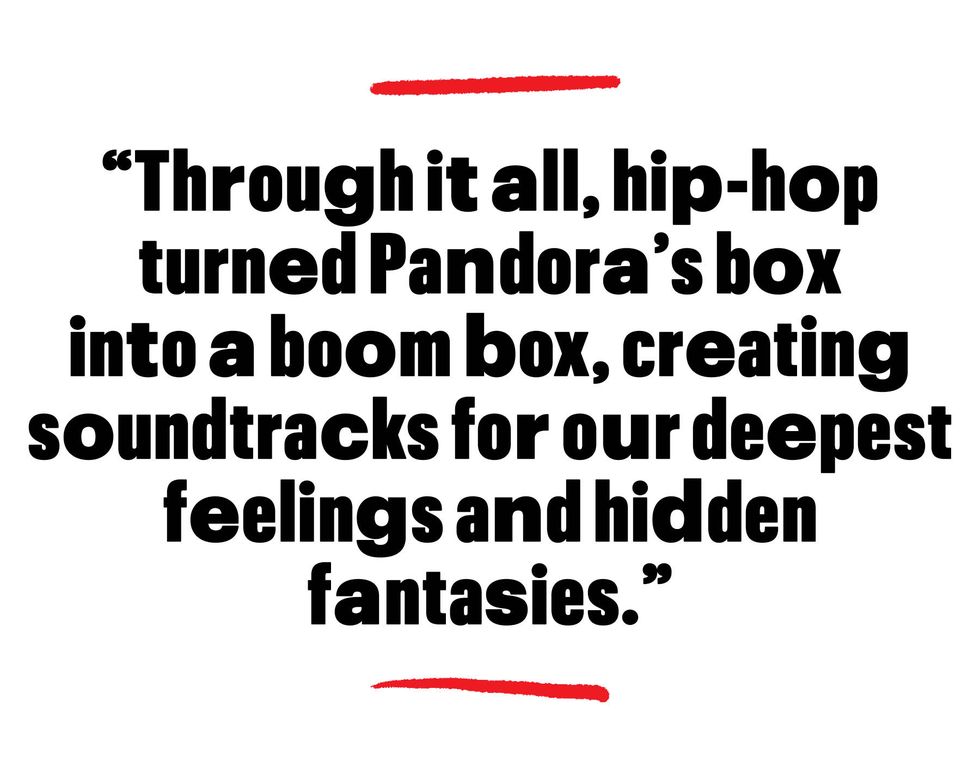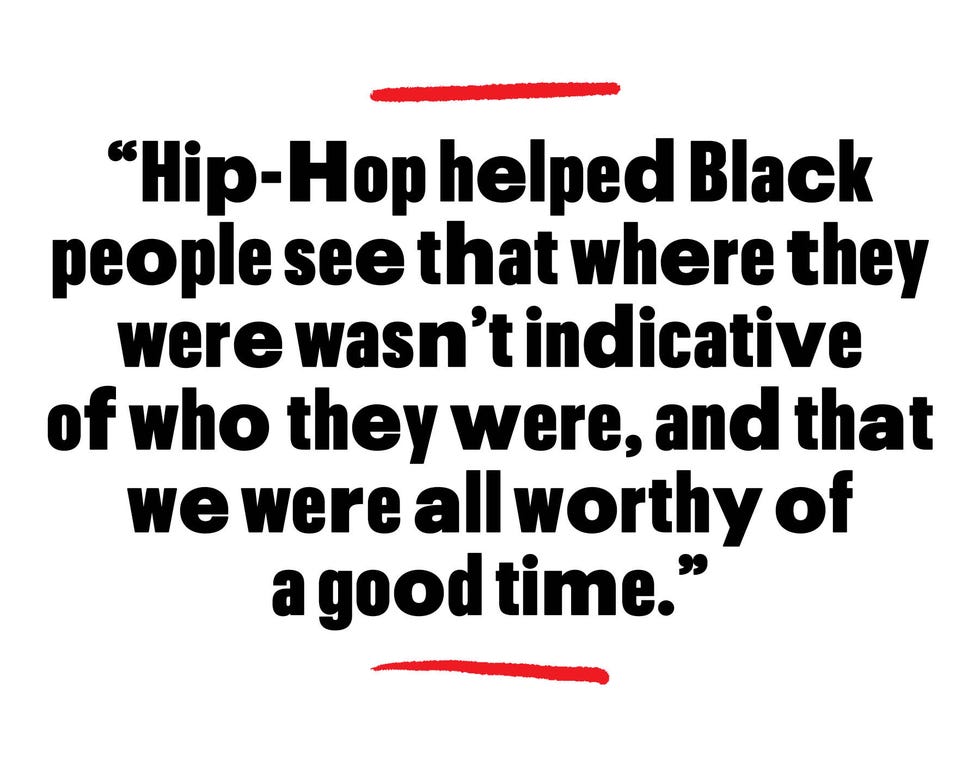This story is part of Hip-Hop Is Life, a series of profiles and features that revisit key moments in the intersection of hip-hop and Black men’s health over the last 50 years. Read the rest of the stories here.
IT WAS MAY 12, 1998, two months after my tenth birthday and a week before DMX’s debut album, It’s Dark and Hell Is Hot, was set to crash-land in stores. In Brooklyn, five-dollar bootleg copies of albums lined the display cases of street vendors well before Tower Records could slap a $15 sticker on them. Occasionally, when I wasn’t sure if there was enough food in the fridge for my mom to scrape together dinner, I would swipe a few copies from downtown Brooklyn to sell to my neighbors back in East New York. Typically, I’d end up with six dollars, earning enough to cover the cost of four chicken wings with shrimp fried rice from the local Chinese food restaurants that outnumbered grocery stores in my neighborhood.
That was my goal that day; hunger was all that was on my mind. A Black vendor, likely three times my age and bodyweight, was tending to a customer when I saw my opportunity to snatch a few CDs and run. Before I could push off my heels, he latched on to my wrist and put me an eyelash away from the barrel of his pistol. My whimpering apologies fell on deaf ears as he kept asking why I would try to take money away from him. I froze. Handling this type of situation never came up in textbooks or family advice. Pedestrians scurried away with the typical aloofness New Yorkers adopt as a means of self-preservation. My mind was blank. I didn’t know if it was because humor was instinctively my third (and preferred) option after fight or flight, but all I could muster was, “I’m just trying to make a dollar out of 15 cents.”
His bloodshot eyes softened, his grip loosened, his gun descended, and he slid a chuckle out of a smirk in the way you do when you can’t do anything but agree. “I feel you” were the last words he said before letting me tearfully run to the nearest train station. I never told my parents out of fear of the punishment that would come from stealing. It wasn’t until a summer block party a month later that I actually heard Tupac recite the exact line that saved my life in his song “Keep Ya Head Up.”
The man let me go because hip-hop translated my desperation into a language he not only understood but spoke. He was trying to make hope out of shitty circumstances just like I was, and just like Tupac and Tupac’s mother, who “made miracles every Thanksgiving” (“Dear Mama”), and my mother. Hip-hop was never just music to me after that day. It became a guide.
This content is imported from youTube. You may be able to find the same content in another format, or you may be able to find more information, at their web site.
Hip-hop is 50 years old, yet its role in documenting and preserving the evolution of Black men’s health has seldom been acknowledged. How could it be when it’s fallen on miseducated ears conditioned to hearing hip-hop but not listening? If you hear Grandmaster Flash & the Furious Five’s 1982 classic “The Message,” you’ll recognize one of the earliest hip-hop records to bring the outside world into the grim circumstances Black people endured. But listening requires a deeper level of understanding of the people being spoken about in the song. When Ed “Duke Bootee” Fletcher wrote the lyrics “You got to have a con in this land of milk and honey,” he was speaking to the fatalist feelings Black Americans experienced with the unemployment rate at 15 percent and crime the only job available for many.
“What’s so incredible about ‘The Message’ is that it connected social circumstances to mental health,” says Olajide Williams, M.D., a professor of neurology at Columbia University and founder of the organization Hip Hop Public Health. “It connected poverty to mental health. It connected the social determinants of health to mental health. That song is Public Health 101. It’s the social circumstances caused by structural racism that created the environment that pushes people to the mental-health cliff.
At its core, hip-hop is a celebratory art form built on the foundation of carving out time and space for joy in order to cope with the world. Remember, hip-hop was born when the Bronx was burning, and people were dancing. Hip-hop helped Black people see that where they were wasn’t indicative of who they were and that we were all worthy of a good time. That’s a through line from the Sugarhill Gang creating the first hip-hop hit (“Rapper’s Delight”) out of funky aspirations in 1979 to Kendrick Lamar inciting communal mosh pits by reassuring us “we gon’ be alright” (“Alright”) in a post–Michael Brown America. That’s hip-hop.
To celebrate hip-hop’s 50th anniversary, Men’s Health is doing more than paying homage to the music; we’re illustrating how the genre has acted as a record of Black men’s health for the past five decades. Whether it’s gun violence, addiction, HIV/AIDS, diabetes, or mental health struggles, hip-hop has taken on the issues of each era that disproportionately harm Black men and given young Black men additional language to put a name to what they are feeling.
Hip-hop is evolving, and each of the titans gracing our cover has had a multi-decade career thanks to his multifaceted influence over Black men. Each of these men represents an archetype of manhood that impressionable Black men could draw on to create their own identity, myself included.
My high school gym teacher would probably throw his back out if he tried doing situps while hanging upside down. 50 Cent did it with ease in his “In Da Club” music video and kept going, building a television empire on the brute determination—it really was either get rich or die trying—that Black men who are systemically shut out of the American dream have to employ. When I was 12, I was a vegetarian for 24 hours after hearing Common say, “My diet I unswine” on “Resurrection.” A few years later, on “Love Is . . .” when he rapped, “As men we were taught to hold it in / That’s why we don’t know how ’til we’re older men,” it gave me the courage to be vulnerable with my feelings. Busta Rhymes transmogrified from Terminator 2 liquid metal into a silver-armored symbiote in his “What’s It Gonna Be?!” music video without damaging his credibility—and this was in the late ’90s, referred to as the polarizing “Shiny Suit era,” when many felt rappers were sacrificing the genre’s rugged realism in favor of ostentatious commercialism. Method Man’s “All I Need” depicted the ghetto as fertile ground for Black love. Ludacris hasn’t aged a day since he served Chicken-N-Beer with a side of southern-fried reality in 2003. Wiz Khalifa kicked the lazy-stoner millennial trope with every MMA workout he shared with his 40 million followers on Instagram.
This content is imported from youTube. You may be able to find the same content in another format, or you may be able to find more information, at their web site.
Through it all, hip-hop turned Pandora’s box into a boom box, creating soundtracks for our deepest feelings and hidden fantasies. Whatever trauma and tragedy has shaped the best hip-hop, it is also a uniquely joyful form of musical expression, and people of all walks] of life find a piece of their own truth in these uniquely Black stories. You’ve likely never run for your life in a war zone, but Outkast’s frenetic “B.O.B. (Bombs over Baghdad)” unlocks the frantic desperation that propels you to your personal best time on a run. The late DMX snarling out, “Y’all gon’ make me lose my mind, up in here” on “Party Up” has helped someone working in a cubicle release frustrations about workplace microaggressions they’ve suppressed throughout the week. Anyone can form a brotherhood under Mobb Deep’s credo of “We in this together, son, your beef is mines” from “Eye for an Eye.” With every Peloton-class inclusion, Pulitzer Prize recognition, and person who sees themselves reflected in a lyric, hip-hop shows that not only do the stories of Black men matter, they help make the world move.
Hip-hop’s health influence hasn’t always been positive, but if you know how to listen to hip-hop, you can hear the Black lives it’s saved by simply existing. Now it’s time to celebrate just how hip-hop did it.
A version of this story appeared in the September 2023 issue of Men’s Health.
Senior Editor
Keith Nelson is a writer by fate and journalist by passion, who has connected dots to form the bigger picture for Men’s Health, Vibe Magazine, LEVEL MAG, REVOLT TV, Complex, Grammys.com, Red Bull, Okayplayer, and Mic, to name a few.




Comments are closed.